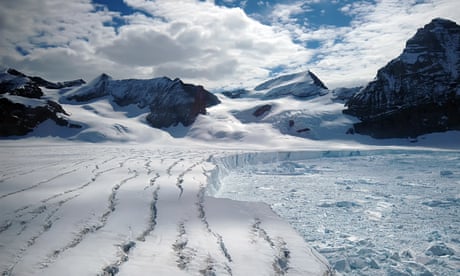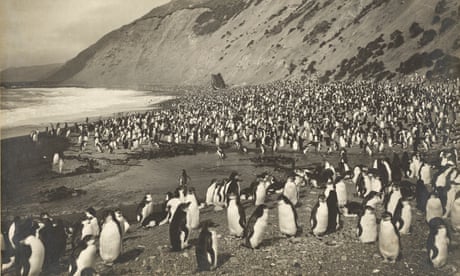New research by Australian scientists suggests 40% slowdown in just three decades could alter world’s climate for centuries
Graham Readfearn
Melting ice around Antarctica will cause a rapid slowdown of a major global deep ocean current by 2050 that could alter the world’s climate for centuries and accelerate sea level rise, according to scientists behind new research.
The research suggests if greenhouse gas emissions continue at today’s levels, the current in the deepest parts of the ocean could slow down by 40% in only three decades.
This, the scientists said, could generate a cascade of impacts that could push up sea levels, alter weather patterns and starve marine life of a vital source of nutrients.
A team of Australian scientists looked at the deep ocean current below 4,000 metres that originates in the cold, fresh and dense waters that plunge down off Antarctica’s continental shelf and spread to ocean basins around the globe.

‘Everyone should be concerned’: Antarctic sea ice reaches lowest levels ever recorded
Prof Matt England, of the Climate Change Research Centre at the University of New South Wales and a co-author of the research published in Nature, said the whole deep ocean current was heading for collapse on its current trajectory.
“In the past, these circulations have taken more than 1,000 years or so to change, but this is happening over just a few decades. It’s way faster than we thought these circulations could slow down.
“We are talking about the possible long-term extinction of an iconic water mass.”
The research looked at what would happen in the deep ocean around Antarctica if the fresher water melting from ice sheets was added to climate modelling.
The modelling for the study assumed that global greenhouse gas emissions remained on their current path, but England said lower emissions could lessen the amount of ice melting which – in turn – could slow the decline.
The slowdown in the deep ocean current relates to the amount of water that sinks to the bottom and then flows north.
Dr Qian Li, formerly of the University of New South Wales and now at the Massachusetts Institute of Technology, was the lead author of the research, coordinated by England.
The study did not attempt to explain or quantify the knock-on effects, but the authors wrote the slowdown would “profoundly alter the ocean overturning of heat, fresh water, oxygen, carbon and nutrients, with impacts felt throughout the global ocean for centuries to come”.
In a briefing, the authors said the deep ocean current influenced the climate around the world, with the potential to radically shift rainfall.
England said the slowdown of the deep ocean current caused those deep waters to heat up.
But as that deep water becomes isolated, it could then cause the upper ocean around the continent to get hotter, kicking off a feedback loop where more melting causes accelerated slowing of the current, which then causes more heating and more ice sheet melt.
The deep water that warms the fastest in the study, England said, was in the same areas – particularly in west Antarctica – where ice sheets were already vulnerable and melting.
“We don’t want to set off a self-reinforcing mechanism in those places,” he said, adding that the slowdown effectively stagnates the deep ocean, starving it of oxygen.
When ocean organisms die, they add nutrients to the ocean water that sinks to the bottom and circulates around the world’s ocean. Those nutrients get returned in upwells that feed phytoplankton – a foundation for the marine food chain.
He said: “Once that overturning circulation slows down, we can only get it back again by no longer releasing meltwater around Antarctica, which means we need a cooler climate and then have to wait for it to restart.
“The longer we go on with higher rates of greenhouse gas emissions, the more changes we commit ourselves to.”
In a briefing, the scientists said the modelling was in line with recent observations of changes to the deep ocean circulation that was suggesting a slowdown may already be taking place.
Rintoul added: “Going back 20 years, we thought the deep ocean wasn’t changing that much. It was too far away to be responsive. But the observations and the models have shown that’s not the case.”

Frozen memories: rare Antarctic expedition images – in pictures
Scientists also think another major ocean circulation in shallower waters that spans the entire Atlantic Ocean – known as the Atlantic Meridional Overturning Circulation – is also slowing down.
Prof Stefan Rahmstorf, an oceanographer and head of earth system analysis at the Potsdam Institute for Climate Impact Research, said the new study – with which he was not involved – showed “a dramatic further weakening is likely around Antarctica in the coming decades”.
He said models presented in major UN climate reports had a “longstanding and major shortcoming” because they didn’t capture how meltwater influenced the deep ocean.
The ocean depths were refreshed in only a few places on the planet close to major ice sheets in Greenland and Antarctica.
“Unfortunately, these locations are all close to the ice sheets of Greenland and Antarctica, which are melting away as a result of fossil-fuel-caused global warming.
“The meltwater dilutes the salt content of these ocean regions, thereby making the ocean waters less dense and thus not heavy enough to sink down and push away the waters already there.”
A slowdown in the deep ocean current could also affect the amount of CO2 that the deep oceans could lock away, Rahmstorf said.
Deep ocean currents around Antarctica headed for collapse, study finds

The deep ocean circulation that forms around Antarctica could be headed for collapse, say scientists.
Such decline of this ocean circulation will stagnate the bottom of the oceans and generate further impacts affecting climate and marine ecosystems for centuries to come.
The results are detailed in a new study coordinated by Scientia Professor Matthew England, Deputy Director of the ARC Centre for Excellence in Antarctic Science (ACEAS) at UNSW Sydney. The work, published today in Nature, includes lead author Dr. Qian Li—formerly from UNSW and now at the Massachusetts Institute of Technology (MIT)—as well as co-authors from the Australian National University (ANU) and CSIRO.
Cold water that sinks near Antarctica drives the deepest flow of the overturning circulation—a network of currents that spans the world's oceans. The overturning carries heat, carbon, oxygen and nutrients around the globe. This influences climate, sea level and the productivity of marine ecosystems.
"Our modeling shows that if global carbon emissions continue at the current rate, then the Antarctic overturning will slow by more than 40 percent in the next 30 years—and on a trajectory that looks headed towards collapse," says Prof England.
Modeling the deep ocean
About 250 trillion tons of cold, salty, oxygen-rich water sinks near Antarctica each year. This water then spreads northwards and carries oxygen into the deep Indian, Pacific and Atlantic Oceans.
"If the oceans had lungs, this would be one of them," Prof England says.
The international team of scientists modeled the amount of Antarctic deep water produced under the IPCC "high emissions scenario," until 2050.
The model captures detail of the ocean processes that previous models haven't been able to, including how predictions for meltwater from ice might influence the circulation.
This deep ocean current has remained in a relatively stable state for thousands of years, but with increasing greenhouse gas emissions, Antarctic overturning is predicted to slow down significantly over the next few decades.
Impacts of reduced Antarctic overturning
With a collapse of this deep ocean current, the oceans below 4000 meters would stagnate.
"This would trap nutrients in the deep ocean, reducing the nutrients available to support marine life near the ocean surface," says Prof England.
Co-author Dr. Steve Rintoul of CSIRO and the Australian Antarctic Program Partnership says the model simulations show a slowing of the overturning, which then leads to rapid warming of the deep ocean.
"Direct measurements confirm that warming of the deep ocean is indeed already underway," says Dr. Rintoul. The study found melting ice around Antarctica makes the nearby ocean waters less dense, which slows the Antarctic overturning circulation. The melt of the Antarctic and Greenland ice sheets is expected to continue to accelerate as the planet warms.
"Our study shows that the melting of the ice sheets has a dramatic impact on the overturning circulation that regulates Earth's climate," says Dr. Adele Morrison, also from ACEAS and the ANU Research School of Earth Sciences.
"We are talking about the possible long-term extinction of an iconic water mass," says Prof England.
"Such profound changes to the ocean's overturning of heat, freshwater, oxygen, carbon and nutrients will have a significant adverse impact on the oceans for centuries to come."
More information: Matthew England et al, Abyssal ocean overturning slowdown and warming driven by Antarctic meltwater, Nature (2023). DOI: 10.1038/s41586-023-05762-w. www.nature.com/articles/s41586-023-05762-w
Journal information: Nature
Provided by University of New South WalesClimate change could cause 'disaster' in the world's oceans, say scientists
No comments:
Post a Comment